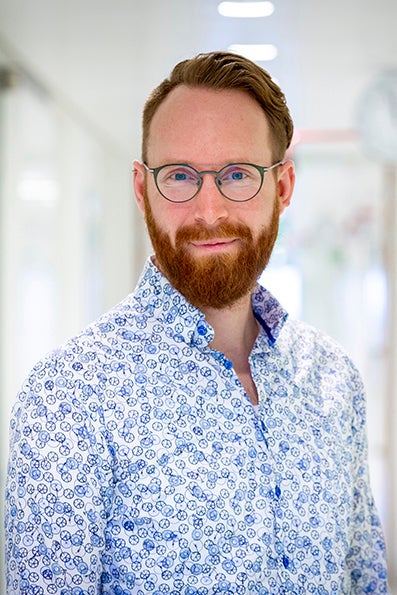'Over the past few years, I have qualified more and more in the field of education. That appealed to me so much that I increasingly made the move from researcher to teacher. What I really like about education is that when you have to explain something to someone else, you have to understand it very well yourself. That really helped me to become better and learn more myself. And the interaction with students is great, from first-year medical students to trainee neurologists. I work with a very wide range of groups.
A little spark
The best part is when students start asking interesting questions. Questions that show that they have understood what I have tried to explain. Their interest is piqued and then you see a kind of little spark develop in them that gets bigger and bigger. That still gives me a lot of satisfaction. Working as a teacher also gives me a lot of energy, actually much more than what I experienced as a researcher. That is a lot of drudgery and a lot of work and not always with success. Then you had to go back to the drawing board to start that whole laborious process all over again. In education, things are very different. If I now give an hour-long study group, for example, I know immediately whether it is successful.
Professional identity
Moving into teaching did mean I had to make choices and reinvent my professional identity. That has been a process of a few years, I must confess. Look, if someone asks what you do and you can say you are a brain researcher, that sounds pretty cool. But if you say you are a teacher, it sounds a lot less sexy. In the beginning, you notice, and I'll put it quite simple now, that the moment you choose teaching more, your fellow researchers think maybe he's not as good after all. Because teaching is what you do if you are not or cannot become a very good researcher. Quite difficult and also exciting how colleagues see you. It took me a while to make the switch. Funny really, because teaching is one of the most important tasks of a university and should be recognised as such as far as I am concerned. Now I have reached the point for some time where I can proudly say that I am a teacher, also because it suits me very well.
Participating in projects
I now only work about 6 to 8 hours a week as a researcher. At crucial moments, I definitely try to think along and co-author articles and applications but I visit the lab very little. But if you look at how little time I actually spend on research, it is still comparatively very successful. Despite my limited time and minimal contributions, I am still regularly asked by my fellow researchers to participate in projects. And yes, I do consider that an honour.
Progressive department
When it comes to Recognition and Rewards appreciation, I think our department is pretty progressive. I am super happy with that. As a staff member, you can really choose whether you go for research or teaching. And if you choose teaching, there are many opportunities to contribute. As a teacher in terms of content, but also when it comes to things like coordination, innovation, policy and strategy. This forward and progressive thinking certainly has to do with certain people on certain positions. With us, that included current rector Jeroen Geurts. As a former section and department head with us, he introduced Recognition & Rewards and put it on the map.
Realise and inspire
We are still reaping the benefits of this. For instance, we now have our own Education & Innovation section with people whose main tasks are in the field of education. Because we have a certain critical mass, we are able to realise educational innovations and inspire fellow faculties. In terms of challenges, we face budget cuts and the need to keep teaching quality high with fewer staff. In any case, I will continue to advocate small-scale education. I would also like to significantly increase student involvement in the development of education. We are now working on that within the ‘students as partners’ project.’
